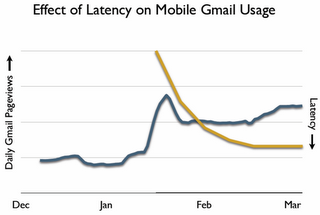Via Russell Buckley: “Portio Reseach have just published a free downloadable PDF, which contains tons of market data on the state of mobile. It’s a taster for the whole report that they want you to buy (fair enough), but there’s loads of facts to get your mind around in the free version.”
Tag: Mobile
iPhone Owners Spend More Time on Phone For Things Other Than Voice
“A survey of 50,000 U.S. households conducted by iSuppli Corp. in the fourth quarter of 2007 found that iPhone users spent just 46.5% of their time on the device making calls, compared to 71.7% for the typical cell phone user. The rest of the time, they were reading and sending e-mail, browsing the Web and checking out Google Maps, among other tasks.”
Via BtoBOnline.com
Slideshow of the Day
My Web Visions presentation has been selected as the “Slideshow of the Day” on Slideshare.net. You can view the presentation here. Or use the embedded version of it below.
As soon as the conference organizers post the audio recording of the presentation, I’ll link to that as well. Some of my slides require explanation.
Thanks to everyone who attended my session and to Slideshare.net for featuring my slides.
Thoughts on Lynne d Johnson’s UnKeynote
I’m nearly recovered from an exceptional Web Visions conference. I had a great time and the feedback on my session has been extremely positive so far. But more on that later.
I wanted to talk briefly about Lynne d Johnson’s UnKeynote from Thursday and why it prompted me to modify my presentation to add a new slide.
For those who weren’t at the UnKeynote, Lynne started the presentation by encouraging audience participation. She wanted to see what sort of presentation or conversation she could facilitate. She has written more about what she wanted to accomplish and her thoughts on how it went. I encourage you to read about her experiment.
For most of the presentation, people would chime in with a thought or two, but the presentation was moving along fairly rapidly. And then Lynne put up the following slide:
This slide remained on the screen for almost the remainder of Lynne’s presentation. Yet, this slide contains only three bullet points about how Japanese youth are reading and writing books on their mobile devices.
This was information that the audience couldn’t accept. It was amazing to see how many people challenged these three facts as data that was either incorrect, trends that can be explained away by cultural differences, or some variation on how reading on phones may be fine for other people, but “I’m never going to do it.”
The audience was resisting the idea of people reading books on their phone. Not simply that they didn’t want it, but that many couldn’t even begin to fathom how this could be true.
My suspicion is that if Lynne were to have presented the same information to a European audience, that they would have nodded their heads in agreement at her points. The experience of Japanese youth is ahead, but not tremendously ahead, of those in Europe.
So I added the following slide to my presentation for Friday morning:
The data in this slide comes from a great discussion we had on the Forum Oxford mobile list that spurred a comprehensive post from Tomi Ahonen.
The point of my slide is simple: an American audience is so far behind in the adoption of mobile technology that we can’t envision, nor accept, the way mobile is being used in other countries.
Like the prisoners in The Allegory of the Cave, the audience couldn’t accept the new reality and even at times strongly challenged Lynne as they tried to reconcile her talk with their current experiences.
This is yet another reason why I tend to think of myself as a mobile evangelist. We’ve got a lot of catching up to do in the United States when it comes to mobile.
P.S. Thanks to Lynne for a great presentation and for the conversations we had afterwards. One of the highlights of the conference was getting to meet her.
Firefox for Mobile Devices
I’m quite excited about this month’s Mobile Portland meeting. Dietrich Ayala from Mozilla will be presenting the future of Firefox for mobile devices.
I’m greatly looking forward to learning more about the Mozilla plans. It seems like webkit has taken a lead in the open source mobile browser space. IE has a larger installed base, but the browser renders poorly. Opera is great, but not open source.
So far, Mozilla’s plans for mobile have been unclear to me other than their obvious statements of plans to support mobile devices. I’m anxious to hear when their plans and timelines.
Firefox is my workhorse browser for development. I wonder what, if any, of the plugins that I rely on for development might work in the mobile space.
If you have any of these questions or others, I encourage you to RSVP and attend this meeting.
Mobile Browser Test
We need your help for a research project we’re conducting at Cloud Four. Read more about the research and how you can help by simply viewing a web page on your mobile phone.
April Meeting of Mobile Portland Monday
Just a quick reminder that Mobile Portland is tomorrow at 6 pm. Visit upcoming for more details and to RSVP.
Speaking at Web Visions in May
I’m happy to announce that I will be speaking at Web Visions on May 23rd on “Going Fast on the Slow Mobile Web.”
Speaking at Web Visions has been a goal of mine for a few years now. Every year Web Vision brings the best and brightest to Portland to talk about the future of web development. After each conference, I’d tell my co-workers that the following year I was going to put together a presentation for Web Visions. Well, I finally did it! :-)
My topic this year combines two interests of mine: the mobile web and web site performance. We’ll be covering the steps necessary to make the web as fast as possible on mobile devices including looking at device-specific details that make performance on mobile devices more challenging.
I’m honored to be included with such a list of illustrious speakers. As I mentioned in my previous post, Jeffrey Veen’s presentation from Web Visions is one of the best I’ve ever seen. Roger Black is one of the big names in design. I’m stunned to be sharing the stage with them. Then we’ve got fellow twitterers and friends like Erica O’Grady and Scott Kveton. And I could go as there are so many names on that speakers list that I admire.
I’m truly overwhelmed and looking forward to May. I hope to see you there. Sign up today for early bird rates.
Verizon’s “Open Networks” Not Very Open, Sprint Breaks the Web
Verizon announced that they would open their network late last year. Last week they provided details which shows that it isn’t terribly open.
Verizon also one the recent spectrum bidding where again, the definition of open is being debated.
Carlo Longino of MobHappy has written about how “open” has become the big buzzword for mobile this year, but most of what is being called open isn’t really very open.
My favorite is Sprint’s new “OpenWeb” service which seems to be breaking everything on the web. What a mess.
Google Speeds Up Mobile Sites, Sees Traffic Increase
One of the reasons for my interest in site performance is because these techniques become even more important when developing for mobile. Google published some recent evidence supporting this belief.
“We saw something similar after we launched an updated interface for Gmail on the iPhone during MacWorld earlier this year. Lots of iPhone users tried the new interface (hence the bump in Gmail pageviews between January and February), but they didn’t stick around like we hoped they would. Over the course of the next few weeks, we made some tweaks to drastically improve the speed of the product, and Gmail pageviews on the iPhone not only stabilized, but began to rise, as the graph below shows:”



